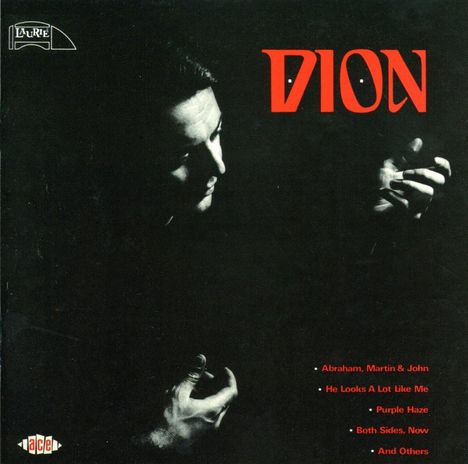Dion: Dion auf CD
Dion
CD
CD (Compact Disc)
Herkömmliche CD, die mit allen CD-Playern und Computerlaufwerken, aber auch mit den meisten SACD- oder Multiplayern abspielbar ist.
lieferbar innerhalb 1-2 Wochen
(soweit verfügbar beim Lieferanten)
(soweit verfügbar beim Lieferanten)
Aktueller Preis: EUR 12,99
- Label:
- Ace
- Aufnahmejahr ca.:
- 1968
- Artikelnummer:
- 9691434
- UPC/EAN:
- 0029667026420
- Erscheinungstermin:
- 5.3.2007
1968. The world is in turmoil. The US are fighting in Vietnam. The Russians are invading Czechoslovakia. Students are rioting in Paris and Chicago. Martin Luther King is gunned down in Memphis. While this is going on Dion DiMucci is down in Florida coming off heroin and preparing to live life straight for the first time in years.
Dion rose to fame in the late 50s as a New York doo wop street punk, one minute serenading sweetly, the next spitting out strutting street anthems like The Wanderer and Donna The Prima Donna. In 1964, however, the hits dried up as Dion became increasingly embroiled in the world of narcotics and pushed his music towards the blues and folk forms that had long since seduced him.
Recorded for Laurie Records, the label where’d he’d first found fame, “DION” is the sound of a soul broken free, released from the shackles of addiction and alive to all life’s possibilities.
Abraham, Martin And John is a Dick Holler song which commemorates the lives of Abraham Lincoln, Martin Luther King and J. F.Kennedy. Though the song might be lyrically simplistic, it’s undeniably beautiful; Dion sings with honeyed sadness and regret, his voice a more mature instrument than that heard on the street corner doo wop records of a decade earlier. It’s easy to see why Columbia’s Mitch Miller saw Dion as a potential inheritor of Sinatra’s throne, though, of course, Sinatra’s voice never reminds you of vocal magicians such as Tim Buckley or Fred Neil, as Dion is here.
Abraham, Martin And John must have been a soothing balm during the political chaos and uncertainty of the time. Its yearning for better times and better men and its warm, embracing arrangement took it into the Top 5 in the States. But if anybody had flipped the single over, they would have heard an entirely different sound, one that offered no succour at all, but which instead embraced the chaos and uncertainty of the times.
Daddy Rollin’ (In Your Arms) (included here as a bonus track) was recorded in Florida earlier in 1968, at a small recording studio near Dion’s house, with Caribbean musicians Dion met locally. Recorded just after his withdrawal from heroin Daddy Rollin’ has none of the sense of release of the A-side, rather it’s claustrophobic, uncomfortable and dark, redolent of the unease and paranoia associated with the addict’s life.
The sound of Dion’s blues and punkier pop excursions on Columbia is gone, his voice wearier, almost haunted. Respected critic Dave Marsh included Daddy Rollin’ at #452 in his list of the 1001 greatest singles ever recorded. Not bad for a B-side. Marsh described the record thus, “Haunted electric guitars clang and clash against one another, drums pound in from another room, uniting in a wad of noise symbolizing nothing but spelling out pain and fear... It was the scariest music Dion ever made.” Listening to it now it’s not very far from the sound of the Velvet Underground, something also heard on Dion’s reunion album with the Belmonts from a year earlier.
Dion approached Laurie Records with Daddy Rollin’ and they agreed to release it provided he also record Abraham, Martin And John. After delivering the single, Dion returned to the studio to record an album in the same vein as the top side. Largely consisting of other people’s songs it features more of Dion’s mellifluous vocals on cushions of swooping, soaring strings and occasional, almost “Forever Changes”-esque horn arrangements. It’s music that wraps you in a gossamer, near opiated embrace, nurturing, secure and sublime.
The second single from the album, Purple Haze, differs radically from the original version. Dion renders Hendrix’s psychedelic brainstorm as something far more pastoral and relaxed, with a touch of Mose Allison about the vocal. Dion sang the song to Hendrix when they shared a stage together and Jimi told him, “It’s exactly right, it’s a different expression, but going to the same place.”
The album’s other songs come from the pens of Bob Dylan, Fred Neil, Lightnin’ Hopkins, Stevie Wonder, Leonard Cohen, Joni Mitchell and Dion himself; they point the way forward to Dion’s early 70s career as a singer / songwriter while also continually reminding us of his, often unacknowledged, vocal prowess.
DION, remastered for this release, has never sounded as good as it does on this CD. The arrangements are open and expansive, the sound deliciously warm and crystal clear. Though I’ve long loved Abraham, Martin And John I never realised quite what a musical jewel it is until hearing it again here. Ace Records are proud to add this album to their catalogue of Dion recordings. It features some of the most beautiful music he ever recorded, as well as possibly the scariest, and deserves to sit alongside the rightly lauded “Born To Be With You” in many a CD collection.
Dion rose to fame in the late 50s as a New York doo wop street punk, one minute serenading sweetly, the next spitting out strutting street anthems like The Wanderer and Donna The Prima Donna. In 1964, however, the hits dried up as Dion became increasingly embroiled in the world of narcotics and pushed his music towards the blues and folk forms that had long since seduced him.
Recorded for Laurie Records, the label where’d he’d first found fame, “DION” is the sound of a soul broken free, released from the shackles of addiction and alive to all life’s possibilities.
Abraham, Martin And John is a Dick Holler song which commemorates the lives of Abraham Lincoln, Martin Luther King and J. F.Kennedy. Though the song might be lyrically simplistic, it’s undeniably beautiful; Dion sings with honeyed sadness and regret, his voice a more mature instrument than that heard on the street corner doo wop records of a decade earlier. It’s easy to see why Columbia’s Mitch Miller saw Dion as a potential inheritor of Sinatra’s throne, though, of course, Sinatra’s voice never reminds you of vocal magicians such as Tim Buckley or Fred Neil, as Dion is here.
Abraham, Martin And John must have been a soothing balm during the political chaos and uncertainty of the time. Its yearning for better times and better men and its warm, embracing arrangement took it into the Top 5 in the States. But if anybody had flipped the single over, they would have heard an entirely different sound, one that offered no succour at all, but which instead embraced the chaos and uncertainty of the times.
Daddy Rollin’ (In Your Arms) (included here as a bonus track) was recorded in Florida earlier in 1968, at a small recording studio near Dion’s house, with Caribbean musicians Dion met locally. Recorded just after his withdrawal from heroin Daddy Rollin’ has none of the sense of release of the A-side, rather it’s claustrophobic, uncomfortable and dark, redolent of the unease and paranoia associated with the addict’s life.
The sound of Dion’s blues and punkier pop excursions on Columbia is gone, his voice wearier, almost haunted. Respected critic Dave Marsh included Daddy Rollin’ at #452 in his list of the 1001 greatest singles ever recorded. Not bad for a B-side. Marsh described the record thus, “Haunted electric guitars clang and clash against one another, drums pound in from another room, uniting in a wad of noise symbolizing nothing but spelling out pain and fear... It was the scariest music Dion ever made.” Listening to it now it’s not very far from the sound of the Velvet Underground, something also heard on Dion’s reunion album with the Belmonts from a year earlier.
Dion approached Laurie Records with Daddy Rollin’ and they agreed to release it provided he also record Abraham, Martin And John. After delivering the single, Dion returned to the studio to record an album in the same vein as the top side. Largely consisting of other people’s songs it features more of Dion’s mellifluous vocals on cushions of swooping, soaring strings and occasional, almost “Forever Changes”-esque horn arrangements. It’s music that wraps you in a gossamer, near opiated embrace, nurturing, secure and sublime.
The second single from the album, Purple Haze, differs radically from the original version. Dion renders Hendrix’s psychedelic brainstorm as something far more pastoral and relaxed, with a touch of Mose Allison about the vocal. Dion sang the song to Hendrix when they shared a stage together and Jimi told him, “It’s exactly right, it’s a different expression, but going to the same place.”
The album’s other songs come from the pens of Bob Dylan, Fred Neil, Lightnin’ Hopkins, Stevie Wonder, Leonard Cohen, Joni Mitchell and Dion himself; they point the way forward to Dion’s early 70s career as a singer / songwriter while also continually reminding us of his, often unacknowledged, vocal prowess.
DION, remastered for this release, has never sounded as good as it does on this CD. The arrangements are open and expansive, the sound deliciously warm and crystal clear. Though I’ve long loved Abraham, Martin And John I never realised quite what a musical jewel it is until hearing it again here. Ace Records are proud to add this album to their catalogue of Dion recordings. It features some of the most beautiful music he ever recorded, as well as possibly the scariest, and deserves to sit alongside the rightly lauded “Born To Be With You” in many a CD collection.
-
Tracklisting
-
Mitwirkende
Disk 1 von 1 (CD)
-
1 Abraham, Martin and John
-
2 Purple haze
-
3 Tomorrow is a long time / Everybody's talkin'
-
4 You better watch yourself (Sonny boy)
-
5 The dolphins
-
6 He looks a lot like me
-
7 Sun fun song
-
8 From both sides now
-
9 Sisters of mercy
-
10 Loving you is sweeter than ever
-
11 Daddy rollin' (In your arms)

Dion
Dion
Aktueller Preis: EUR 12,99





